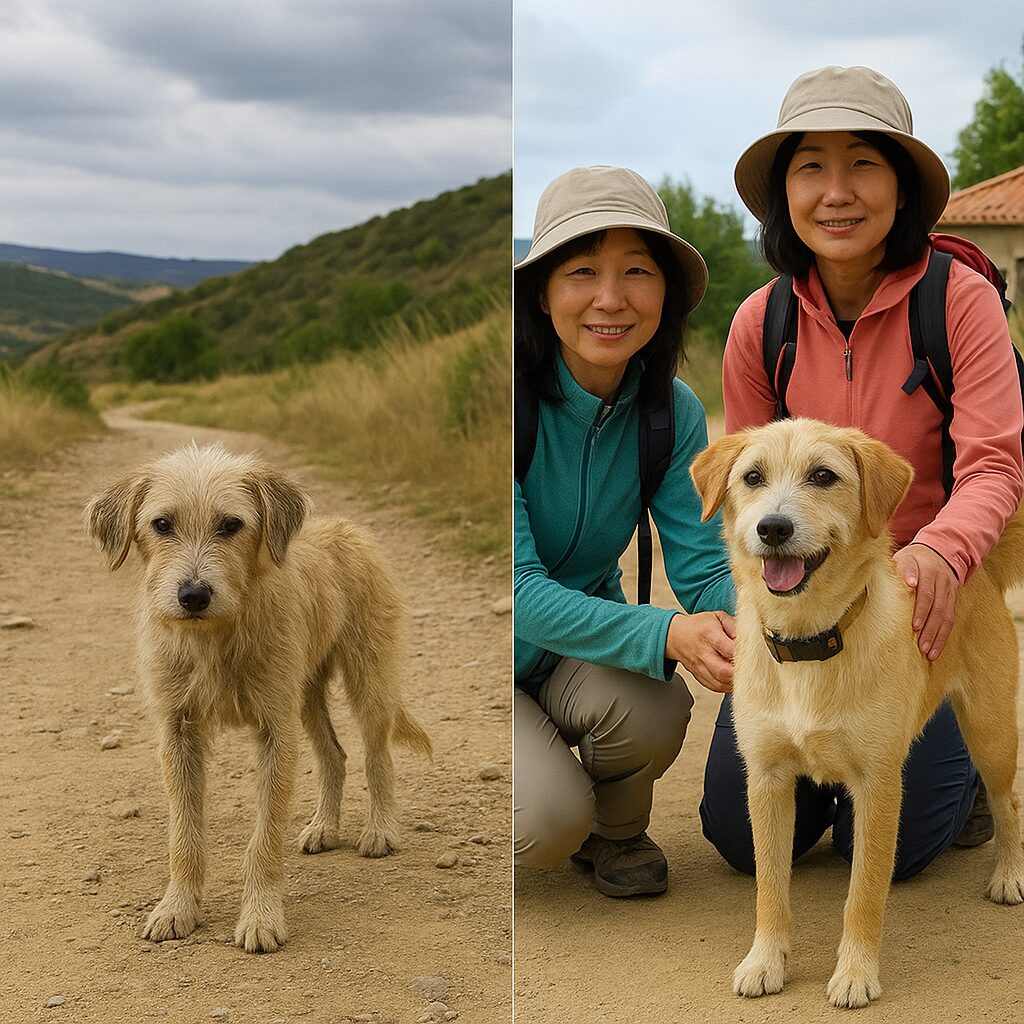The Camino de Santiago is one of the world’s most storied pilgrimage routes — a centuries-old trail that has carried millions of travelers across Spain in search of faith, reflection, and renewal. Pilgrims from every corner of the globe walk its dusty paths, tracing footsteps that stretch back to the Middle Ages. But in 2025, along one of those sun-baked trails, a story unfolded that was unlike any other.
It was not the story of relics or cathedrals, nor of ancient saints. It was the story of a scruffy, lonely dog who crossed paths with two Japanese women, and how their compassion turned an abandoned life into a new beginning. They named him Michi, a word that means “path” or “way” in Japanese — a fitting tribute to both the Camino itself and the new journey the three would take together.
A Chance Encounter on the Road to Santiago
For many pilgrims, walking the Camino is a deeply personal challenge. It demands endurance, faith, and resilience. Days stretch on with the crunch of gravel underfoot, blistered heels, and the rhythmic swing of backpacks beneath the Spanish sun.
When the two Japanese women pilgrims spotted a dog lingering by the roadside, it was clear he did not belong to any of the walking groups. His fur was matted, his ribs faintly visible, and his gait unsteady. He approached warily, half-curious and half-afraid. His eyes — tired yet pleading — told a story of abandonment.
On a route where hospitality toward strangers is a core tradition, the women paused. For them, the journey was about connection, reflection, and kindness. To turn away from a creature in need would have contradicted the very spirit of the pilgrimage.
They offered him water. He drank eagerly. They shared scraps of food. He followed.
From that moment forward, the Camino was no longer just their pilgrimage — it became their shared path with Michi.
Naming Michi: The Significance of “The Way”
In Japanese, the word “michi” carries layers of meaning. It translates literally as “road” or “path,” but culturally it suggests more: a way of life, a journey of the spirit, or even a discipline (as in “do” from martial arts like judo or kendo).
By naming the dog Michi, the pilgrims did more than give him a label. They gave him identity and purpose. Just as they had chosen to walk this ancient route in search of renewal, Michi now had his own way forward — a symbolic transformation from abandonment to belonging.
For the pilgrims, it was also a reminder that the Camino itself teaches openness. One never knows who — or what — will join the journey. Sometimes, it is fellow travelers. Other times, it is a stray dog who needs a second chance.
The Challenges of Caring for a Dog on the Camino
Caring for Michi was not easy. Pilgrims walk long distances daily, often under punishing sun or rain. Food is carried sparingly, and accommodations vary from hostels to monasteries, many of which are not equipped for animals.
Yet the women adapted. They made sure Michi had food, carrying extra provisions despite their own limited supplies. They scouted shady resting spots during breaks, shielding him from the midday heat. At hostels where dogs were not allowed, they sometimes slept outdoors, refusing to leave him behind.
Other pilgrims noticed. Some smiled at the companionship. Others offered snacks, old blankets, or extra water. In the communal spirit of the Camino, Michi became not just their dog, but a kind of shared mascot of resilience and hope.
Stories of Dogs on the Camino
Michi’s story is unusual, but not entirely unique. Over the years, tales of dogs appearing on the Camino have circulated in pilgrim communities. Some are local farm dogs that walk alongside travelers for a stretch before returning home. Others are abandoned animals who latch onto groups, sensing food and safety.
But rarely do these encounters result in permanent bonds. Most pilgrims, bound by the limits of international travel, leave the dogs behind, trusting local shelters or fellow walkers to care for them. What set Michi’s story apart was the determination of his rescuers to go beyond temporary kindness.
The Japanese pilgrims decided that Michi’s journey should not end at the trail. He deserved a family.
From Stray to Beloved: Finding Michi a Home
As the days stretched on, Michi’s transformation was remarkable. With consistent meals, his frame began to fill. His fur grew shinier, his tail wagged more often, and his once-hesitant demeanor blossomed into trust. He walked proudly beside the women, sometimes leading the way, sometimes trotting behind.
By the time they reached Santiago de Compostela, the pilgrims had a decision to make. They could not take Michi back to Japan themselves — the logistics and regulations were too complicated. But abandoning him again was unthinkable.
They reached out to local rescue groups, animal shelters, and networks of Camino volunteers. Word spread. Eventually, a family stepped forward, moved by the story of this dog who had walked part of the pilgrimage route. They agreed to adopt Michi, giving him a stable, loving home in Spain.
It was a bittersweet farewell for the Japanese pilgrims, who had bonded deeply with the dog. Yet their faces shone with joy knowing that their compassion had rewritten the ending of his story.
Why Michi’s Story Resonates
There are countless rescue stories worldwide, but Michi’s stands out for several reasons:
- Cross-Cultural Connection
The rescuers were Japanese pilgrims walking a Spanish route, saving a dog abandoned far from their homeland. It is a testament to compassion transcending borders. - Symbolism of the Camino
The Camino de Santiago is about transformation and renewal. Michi’s journey mirrored the essence of the pilgrimage — a lost being finding direction and meaning through persistence and kindness. - A Message of Hope
Stories of abandonment often end tragically. Michi’s survival and adoption offered a rare, uplifting reminder of what is possible when people intervene with care.
The Broader Issue: Abandoned Animals in Spain and Japan
Michi’s tale is inspiring, but it also highlights a global issue: the abandonment of dogs.
- In Spain, despite improvements in animal welfare, thousands of pets are abandoned annually. Many are left at the beginning of summer vacation when families travel and no longer want the responsibility.
- In Japan, although stray dog populations are smaller thanks to strict pet regulations, abandonment still occurs. Animal advocates continue to push for adoption over pet shop purchases, and for stronger welfare laws to protect vulnerable animals.
Michi’s story bridges these two realities. It reminds us that abandonment is not confined to one nation or culture — it is a human problem that requires human solutions.
Pilgrimage as a Metaphor for Rescue
Walking the Camino is often described as a metaphor for life itself: unpredictable, challenging, filled with moments of despair and beauty alike.
Michi’s rescue fits seamlessly into that metaphor. Just as pilgrims push through fatigue and blisters to reach Santiago, Michi pushed through hunger, fear, and loneliness until compassion found him. His journey mirrors the pilgrim’s — a story of endurance, renewal, and hope at the end of the road.
For the Japanese women, their Camino was no longer simply about personal reflection. It became an act of service, of extending kindness to the vulnerable. In rescuing Michi, they embodied the spirit of pilgrimage more fully than they might have imagined at the outset.
Lessons from Michi the Camino Dog
- Compassion Is Action
Kindness means more than feeling sorry. It means stopping, sharing food, carrying extra weight, and refusing to turn away. - Journeys Are Shared
No pilgrimage — and no life — is walked alone. Michi reminds us that unexpected companions can shape our stories profoundly. - Borders Don’t Define Love
Two Japanese women saving a Spanish dog shows how care and responsibility extend beyond nationality or language. - Every Life Deserves a Second Chance
From abandoned and frail to healthy and adopted, Michi’s transformation is proof that no being is beyond redemption.
Michi’s Legacy
Today, Michi lives in comfort with his new family in Spain. He no longer wanders roadsides in search of scraps. Instead, he has a bed, a bowl, and people who call his name with affection.
For the two Japanese women, the Camino gave them more than they expected. They returned home not only with stamps in their pilgrim passports and memories of cathedrals, but with the knowledge that their kindness had altered the course of another being’s life.
Their story has since been shared widely, inspiring pilgrims and animal lovers alike. Many have commented that Michi became a symbol of the Camino’s true meaning: finding purpose and offering love along the way.
Conclusion: A Way Forward
The Camino de Santiago is often called “The Way” — a path of transformation, faith, and discovery. For Michi, it was literally that: a way out of abandonment, a way into companionship, and a way toward a family.
In naming him Michi, the Japanese pilgrims affirmed what the Camino teaches every traveler: that the road is not just about reaching a destination, but about how we walk it, who we walk it with, and how we choose to respond to the lives we encounter along the way.
Michi’s story is a reminder that even in the dust and exhaustion of long roads, compassion has the power to change everything. Sometimes, the greatest pilgrimage is not about where we go — but about whom we choose to walk beside.

